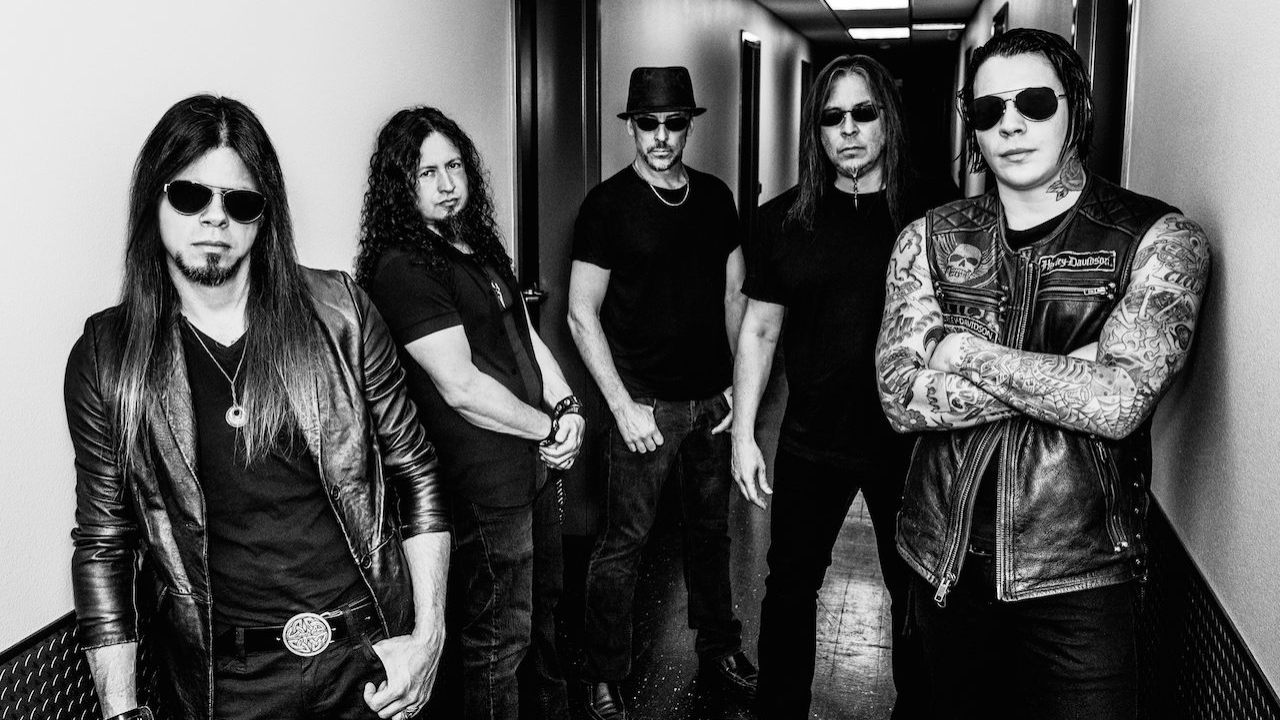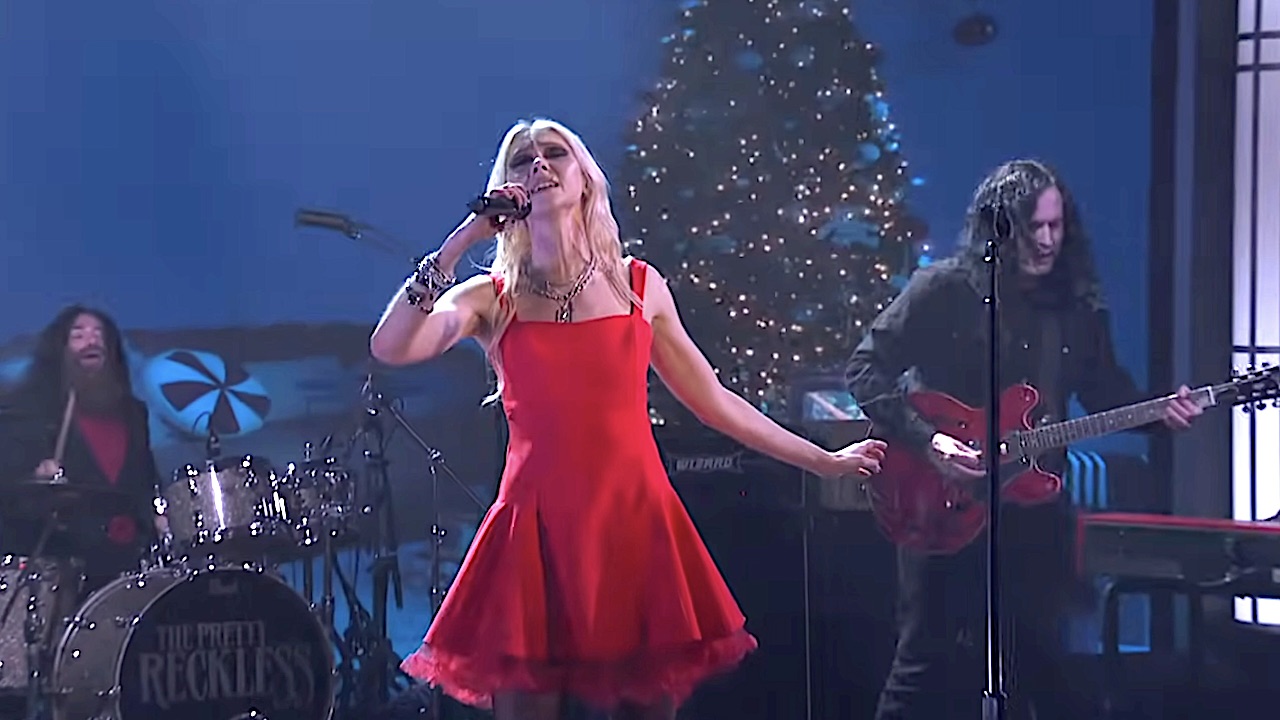Tr+ Extended Interview – Welcome Back: Queensrÿche
The prog-metallers have overcome feuds with their former singer to focus on the future – and new music.

The campaign for Queensrÿche, which in 2013 introduced lead singer Todd La Torre to the Seattle-based progressive metal band of the same name, was overshadowed by tales of on-stage spitting and even a knife stand-off in Brazil.
With the dispute between Queensrÿche and their former frontman Geoff Tate now resolved, and both factions unveiling new music (Tate’s group are known as Operation: Mindcrime) it’s time to leave the past behind. But forgiveness? That’s not on the menu, says guitarist Michael Wilton.
There was minor criticism of the band’s recent show in London, which was shorter than expected and saw the dropping of some fan favourite tunes.
Todd La Torre: I was just coming down from a really bad cold. Even now, I can’t get rid of it [some two weeks later he actually coughs and splutters all the way through this interview].
Michael Wilton: But the reality is that with three bands on the bill [Armored Saint and Death Angel also appeared] sometimes there’s no alternative but to cut things down.
Afterwards there was some speculation that the settlement between yourselves and Geoff Tate might limit how many tunes Queensrÿche can perform from the band’s watershed album, Operation: Mindcrime. In London we got just four of them.
Wilton: The agreement is that we can play no more than five or six tunes per evening, excluding segues and instrumentals. And that’s completely fine with us; we’re more about the band’s entire discography.
Sign up below to get the latest from Classic Rock, plus exclusive special offers, direct to your inbox!
So for those unaware: Tate alone is allowed to perform *…Mindcrime *in its entirety, and you guys kept the name?
Wilton: That’s correct. It was important for us to stay as Queensrÿche as we are three guys [including bassist Eddie Jackson and drummer Scott Rockenfield] who actually started this whole thing back in the early 1980s, and I’m happy to say that’s what we managed to do. If you ask me, *Operation: Mindcrime *has already been performed from start to finish quite a lot.
Michael, how did Todd appear on Queensrÿche’s radar?
Wilton: Three years ago I literally bumped into him at a party at the NAMM Convention. I had a plate of hors d’oeuvres and Todd came over to say that I’d played a great show on the previous night. He mistook me for Eric Peterson of Testament. I was about ready to blow the guy off and he realised the mistake [laughs]. It was a miraculous coincidence that he would be available just as we needed somebody.
Shut your eyes and Geoff Tate – the young Geoff Tate – is back in the room.
Wilton: Yeah. He’s such a fan of operatic singing. Todd’s a fan of the progressive-metal genre; that whole style of singing, the Bruce Dickinson thing.
Todd, presumably you take the comparisons to a young Tate as a compliment?
La Torre: Well, I don’t think I sound exactly like him. There are times when I do and others when I don’t. I don’t like it when it’s used in a condescending way; like I’m a copycat or something, but it’s like someone saying, ‘Oh, you play golf like Tiger Woods’ – of course it’s a compliment!
Two albums into your spell with the ’Rÿche you must feel more like a piece of the furniture.
La Torre: For sure. We had more time to make it and I felt able to do a few new things that would have been out of place on the first one.
Was getting to join Queensrÿche a bit of fan-boy thing for you?
La Torre: Oh, definitely. From the age of about 14 I was a massive fan, though my enthusiasm fell away after Empire [1990] when they were getting lighter and I was still into heavy music.
Like its self-titled predecessor, stylistically speaking the second Todd-fronted album *Condition Hüman* remains rooted in the sound of those early, vintage Queensrÿche albums.
Wilton: Yeah. We’re just being true to ourselves. I played the guitar parts on those records so I’m deeply rooted in that kind of playing. Touring these last two years, a lot of fans are coming out again who haven’t seen us since 1993. But of course at the same time we’re also trying to portray a 2015 version of Queensrÿche.
Do you agree that the band lost its way with the latterday Tate-driven records, particularly the 2013 album *Dedicated To Chaos*?
Wilton: Yeah, for sure. It’s been well documented that nobody was seeing eye to eye on a creative level, or indeed a business level.
It must have been a trying time?
Wilton: I think I’ve said all I can say on the subject [of Tate].
Have you heard any of The Key, the debut album from his band Operation: Mindcrime?
Wilton: I haven’t. Someone sent me a link to a teaser clip, but I haven’t really… [his words taper off]. Do I have any interest in hearing it? I’m sure at some point someone will pass a copy along, but right now I’m not going to make the effort to go out and get it.
And if he contacted you to let bygones be bygones, would you be open to the idea?
Wilton: It’s too close. It’s still too raw. Both sides [of the rift] are concentrating on getting their new situations going. The entire focus and energy is on Queensrÿche 2015, and I’m sure his camp is the same, so it’s way too soon for anything like that.
Queensrÿche 2015 must now be a far happier place?
La Torre: Very much so. Everyone’s getting along. Everyone is getting to contribute to the music. Psychologically, we’re in a really good place.
But from the outside looking in, following all the ructions, it might have taken a brave man to step into the aftermath, and to follow a singer like Tate.
La Torre: I had no reservations. I’d already gone down that route of getting into a band as replacement for a loved singer [Midnight] in Crimson Glory, so I knew all too well that there would be a lot of mean and critical people. But I really didn’t care.
In some ways, did the cynicism motivate you?
La Torre: Of course it did, and I also wanted us to do the old classic style that Queensrÿche used to do. If anything, I felt like I was bringing something back to the band that had been missing for decades. I love to sing those really old songs, things like Queen Of The Reich or Prophecy [both from the band’s debut EP, 1983], and we’ve also done Child Of Fire [from the following year’s full-length debut, The Warning]. Some people say, ‘Queensrÿche was never a metal band’. What bullshit! Of course it was. It wasn’t exclusively a metal band – there were hard rock and prog elements – but heavy metal is what the whole thing was based upon.
You previewed one song from Condition Hüman on the UK tour ahead of its release. Is the plan to come back for more dates once the fans have got to know the album?
Wilton: Yeah, that’s it exactly. That last British run was so successful the booking agent said they want us back in June or July next year.
Classic Rock 216: News & Regulars
_

Dave Ling was a co-founder of Classic Rock magazine. His words have appeared in a variety of music publications, including RAW, Kerrang!, Metal Hammer, Prog, Rock Candy, Fireworks and Sounds. Dave’s life was shaped in 1974 through the purchase of a copy of Sweet’s album ‘Sweet Fanny Adams’, along with early gig experiences from Status Quo, Rush, Iron Maiden, AC/DC, Yes and Queen. As a lifelong season ticket holder of Crystal Palace FC, he is completely incapable of uttering the word ‘Br***ton’.
